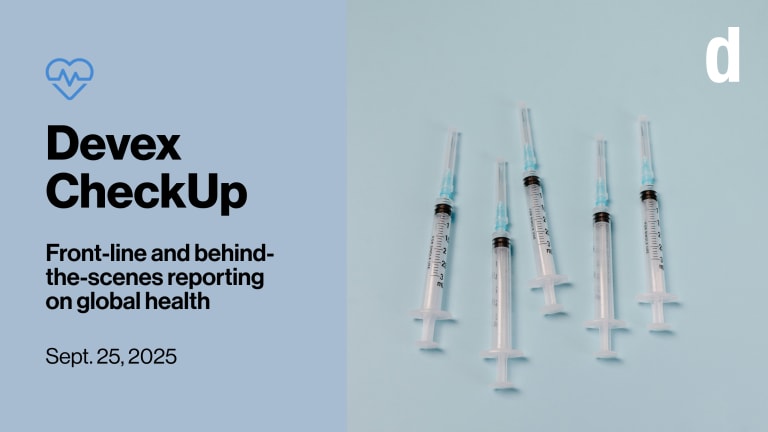
Over 1.5 billion COVID-19 vaccine doses have been administered globally, but health workers in countries such as Chad have yet to receive a single one. COVAX, the only global mechanism that most lower-income countries rely on for doses, is struggling to secure supplies. It aimed to deliver 170 million doses by this week but is now only topping 65 million.
This is a preview of Devex CheckUp
Sign up to this newsletter for exclusive global health news and insider insights, in your inbox every Thursday.
• The Serum Institute of India, a major supplier to COVAX, will continue to prioritize domestic vaccine supplies, though it expressed hope that it could restart deliveries to COVAX and other countries by the end of 2021.
• India needs roughly 1.9 billion doses to cover 940 million people. But domestic vaccine production is estimated to reach only 170 million doses by the end of June. That means about 230 people are competing for each injection, and those with no access to digital technology are at a disadvantage. Smartphone penetration in rural India reached only 25% in 2018, and just 4% of rural households had access to computers. Mahima Jain reports for Devex.
• COVAX’s expected 190 million dose shortfall in June could be made up another way, according to UNICEF chief Henrietta Fore. If G-7 and “Team Europe” donate 20% of their collective vaccine supply between June and August, that would amount to 153 million doses. U.S. President Joe Biden has already announced that the country will be sending an additional 20 million doses overseas in the next six weeks, bringing its total sharing commitment to 80 million doses.
• From 152 new cases on April 1 to 8,136 on Tuesday, Nepal is witnessing a surge that is overwhelming the health care system. Even as the country witnessed neighboring India’s rising crisis, Nepalese officials wasted a crucial period by failing to take action, experts say. Deepak Adhikari reports for CheckUp.
• Guatemala is one of many low- and middle-income countries that are increasingly reliant on vaccine diplomacy from other nations, such as Russia, in the absence of COVAX supplies. The Latin American country is set to receive its second shipment of Sputnik V doses Thursday. Teresa Welsh reports from Quetzaltenango.
CEPI 2.0
The Coalition for Epidemic Preparedness Innovations was just three years old when COVID-19 struck at the beginning of 2020, transforming the organization’s work and plans. Now, lessons from the pandemic are informing CEPI’s future strategy. Its goals include cutting the vaccine development timeline to 100 days, building clinical trial networks that can rapidly test vaccine candidates, and increasing countries’ capacity for vaccine manufacturing. Andrew Green reports for Devex.
WHA-t ifs
Vaccine access is expected to be a major topic at the 74th World Health Assembly next week, but it won’t be the only one.
• There is significant interest in a pandemic treaty, but it’s unclear whether member states will forge one in the days ahead. “That's a real crystal ball question,” says Steve Solomon, principal legal officer at WHO, who says he wasn’t aware of a draft treaty.
• Member states are expected to adopt recommendations on ways to strengthen WHO, as well as how to better prepare for and respond to health emergencies, following a recent report on the subject by an International Health Regulations review committee.
• Members will also be asked to adopt a resolution on the process for the 2022 election of WHO’s next director-general. One question is whether to use optical scanners for ballots, even though a study by the secretariat recommended counting votes manually as usual. Solomon said the vote will take place in May of next year, even if it’s for the reelection of current chief Dr. Tedros Adhanom Ghebreyesus.
• Several member states are also negotiating the text for a resolution on boosting action around diabetes prevention and control. Advocates want the resolution to require WHO to develop specific targets on prevention and insulin access.
Register: Join us for daily conversations during WHA, with exclusive interviews, expert analysis, and insider coverage.
Global health job of the week
Planning, Performance Monitoring and Assessment Specialist
Pan American Health Organization
Washington, D.C., U.S.
As the name suggests
Long before COVID-19, the organization Ending Pandemics was already working with communities globally to stop outbreaks. Its focus? Effective disease surveillance at the local level. Catherine Cheney speaks with Mark Smolinski, an infectious disease physician and president at the San Francisco-based nonprofit.
Gates keepers

Before its co-founders announced their divorce, the Bill & Melinda Gates Foundation recorded $4.4 billion in grants during 2020, as well as over half a billion dollars in 2021. Global health organizations have accounted for 38% of awarded funding since the beginning of last year. The Global Fund topped the list of recipients, with a single but significant grant worth $732 million.
For our Pro subscribers, Raquel Alcega and Lisa Cornish break down where else Gates grants have gone and how much they’re worth.
What we’re reading
Fighting between Hamas militants and the Israeli military has left hundreds of thousands in Gaza with limited access to clean water and medicine. [The New York Times]
Malawi destroys nearly 20,000 expired AstraZeneca vaccines despite assurances from the African Union and WHO it can still be used until mid-July. [Reuters]
Singapore approves the Pfizer-BioNTech coronavirus vaccine for children ages 12-15. [CNBC]










